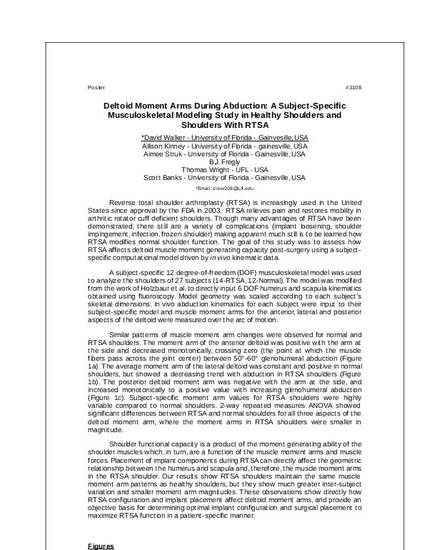
Article
Deltoid Moment Arms During Abduction: A Subject-Specific Musculoskeletal Modeling Study in Healthy Shoulders and Shoulders with RTSA
27th Annual Congress of the International Society for Technology in Arthroplasty
Document Type
Conference Paper
Publication Date
9-1-2014
Abstract
Reverse total shoulder arthroplasty (RTSA) is increasingly used in the United States since approval by the FDA in 2003. RTSA relieves pain and restores mobility in arthritic rotator cuff deficient shoulders. Though many advantages of RTSA have been demonstrated, there still are a variety of complications (implant loosening, shoulder impingement, infection, frozen shoulder) making apparent much still is to be learned how RTSA modifies normal shoulder function. The goal of this study was to assess how RTSA affects deltoid muscle moment generating capacity post-surgery using a subjectspecific computational model driven by in vivo kinematic data.
Document Version
Published Version
Copyright
Copyright © 2014, International Society for Technology in Arthroplasty
Publisher
International Society for Technology in Arthroplasty
Place of Publication
Kyoto, Japan
Peer Reviewed
Yes
Disciplines
Citation Information
David Walker, Allison Kinney, Aimee Struk, Benjamin J. Fregly, et al.. "Deltoid Moment Arms During Abduction: A Subject-Specific Musculoskeletal Modeling Study in Healthy Shoulders and Shoulders with RTSA" 27th Annual Congress of the International Society for Technology in Arthroplasty (2014) Available at: http://works.bepress.com/allison_kinney/17/
Document is made available for download with permission from the publisher. Permission documentation is on file.